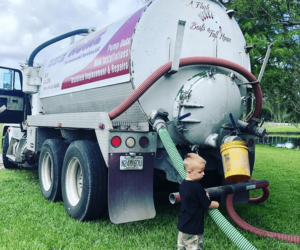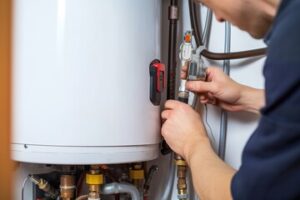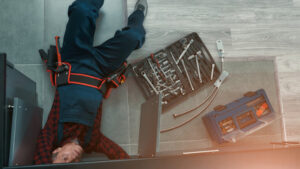Septic tanks keep wastewater contaminants from clogging the drain field and soil. This is why it’s important only to flush septic-safe items like toilet paper, sanitary products, and trash. Non-septic safe items like cigarette butts, cotton swabs, and menstrual hygiene products can clog your system and cause costly damage. Contact Septic Tank Armadale now!
If you notice water pooling in the yard or around your septic tank, you should immediately call a professional septic service. Seeing water near your septic tank is an indication of a serious problem with the system and could require expensive repairs or replacement of the whole septic system. It could also be a sign of sewage backing up into your home. This is dangerous for you and your family and should be addressed by a plumber as soon as possible.

Wastewater from toilets (called blackwater) and your sinks, bathtubs, showers, washing machines, and dishwashers (called greywater) runs through a main drainage pipe that leads to the septic tank. Solids sink to the bottom of the tank and form sludge, while fats, oils, and greases float to the top and form scum. Anaerobic bacteria in the tank break down these pollutants. Liquids then exit the septic tank and enter the drain field through perforated pipes, where they seep into a layer of gravel.
Overflowing or standing water is the most common sign of septic tank problems. It can be caused by heavy rains or overuse of the septic tank or can indicate that it’s time for the tank to be pumped.
Other signs of a septic tank problem include slow draining and gurgling noises from your drains. The slow draining is due to a septic tank that’s full or a clogged drain line. The gurgling noises are a result of the pressure of wastewater and sludge forcing it through your plumbing and into your house.
One of the most serious septic tank issues is materials being introduced that are detrimental to the septic system. These can kill the microorganisms in the septic tank and lead to overflowing. This can happen if non-biodegradable materials like sanitary products or disposable nappies are flushed down the drains. It’s important to limit these items, plant trees far from the drain field, and have your septic tank inspected and pumped regularly.
Taking these steps can help prevent septic tank overflow and ensure your drain field is functioning properly. A well-maintained septic system, including routine inspections and a regular schedule of pumping every 2-3 years can extend the life of your septic tank and prevent costly repair or replacement costs down the road.
Sewage Smells
Many homes are not connected to a central sewer system and instead rely on individual septic systems. These systems treat household wastewater, primarily from toilets, showers, and sink drains, before dispersing it to the soil via a series of perforated pipes known as an absorption field. Unfortunately, these septic tanks can be prone to issues that call for professional plumbing services, including a distinct sewage smell.
The odor of sewage is caused by the breakdown of organic materials in the waste stream. When bacteria break down these materials, they produce a gas called hydrogen sulfide. This gas can seep through your home’s plumbing and create a strong rotten egg odor throughout the house.
You might also notice that your toilets take longer than usual to drain after flushing. This is often a sign that your septic tank is overflowing. It’s important to keep up with routine septic tank maintenance to ensure that your home is properly treated.
A professional plumber can check your septic tank to determine whether it needs to be pumped. They can also help with clogged toilets, backed-up drains, and other symptoms of a faulty septic system.
If you’re noticing the odor of sewage throughout your home, it’s important to get professional help as soon as possible. These odors are dangerous and can indicate that the septic system is leaking or blocked. A professional can provide drain cleaning, snaking, and hydro jetting to resolve the issue quickly and safely. They can also ensure that the septic tank is not full, which will help prevent sewage from backflowing into your home. They may also recommend a septic tank replacement if the system is reaching capacity.
Sewage Backflow
Septic tanks have a specific capacity for the amount of wastewater they can hold. If the tank reaches capacity, wastewater can’t flow out of the home and may start to back up into drains and toilets. The secret to avoiding this problem is to have the tank pumped regularly.
During the treatment process, bacteria create gases that are emitted from the system. These gases, including hydrogen sulfide (that smells like rotten eggs) and carbon dioxide, need to be released so they don’t build up inside the house and cause health problems. The gases are released through a vent located on the lid of the septic tank. This vent is covered by a mushroom-shaped cap that can be fitted with a charcoal filter to reduce odors.
The inlet and outlet tees on the top of your septic tank are designed to allow liquid wastewater to flow out through the scum layer and the sludge layer to avoid solids making their way into your absorption field. Solids that make it to your septic tank are usually made up of non-flushable wastes like cooking grease, diapers and paper towels. These solids clog pipes and reduce the efficiency of your septic tank and absorption field.
Heavy rains can also overwhelm your septic system by oversaturating the soil in and around the drain field. This can result in wastewater treatment slowing down or stopping entirely until the soil is able to absorb more wastewater. If you experience a heavy rain and notice this problem, consider taking shorter showers or putting off washing clothes and laundry until the weather improves.
If you notice a septic tank backup in your home, contact a professional for help immediately. Sewage backflow can carry disease and pose a serious health risk to your family. It’s also a fire hazard, since methane gas, which is produced in sewage, can ignite when it comes into contact with a flame.
Older septic systems don’t have the bells and whistles that today’s models offer, such as dip pipes and a double-chamber design that separates solids from wastewater. Investing in a new septic system will provide you with a modern and more efficient water treatment solution that can handle the demands of your household.
Clogged Drains
A slow draining sink or shower is one of the first indications that something is wrong with a septic system. Whether from non-flushable items or a major system clog, the problem will quickly spread if not addressed quickly.
Using the right tools and tried-and-true methods, homeowners can often resolve their own clogged drains without calling in a professional. If you suspect you have a septic tank clog, start by looking for the access lid. It’s usually located in your yard near your home. Once you locate it, lift it and set it aside. Find the inlet pipe, which is a green or white tube that runs from the tank to your house. It’s typically a few feet from the tank opening. The pipe is likely clogged with scum, which is solid waste that floats on top of the liquid wastewater inside the tank. Use a wooden pole or rod to push scum out of the pipe and away from the inlet opening.
If this doesn’t work, you’ll need to move on to another method. If you have a mechanical auger, put the rotating bit into the clogged pipe at an access point such as a cleanout port or end of the inlet pipe. Plug the auger in and turn it on to begin breaking up the clog. Keep in mind that this tool can be dangerous if used improperly, so only a trained professional should operate it.
Chemical-laden cleaners like bleach can also harm your septic system by killing the bacteria that breaks down waste. Try to keep a supply of septic-safe drain cleaner on hand to avoid this issue.
You can prevent clogged drains from occurring in the first place by installing screens over your drains and keeping non-flushable items out of your toilets. Also, make sure to only flush a few times per day and limit your water usage during heavy rains. Lastly, a regular application of septic-safe septic tank treatment products like Muck Muncher helps to maintain the proper balance of bacteria in your septic tank to prevent clogs.

